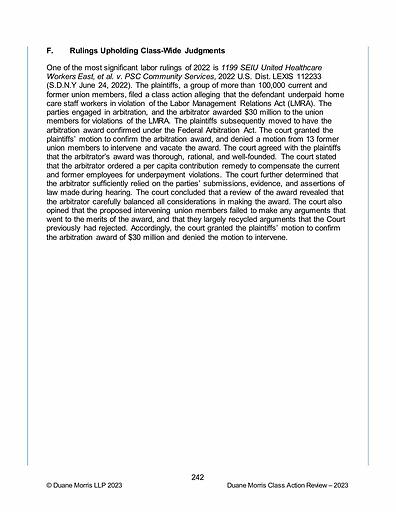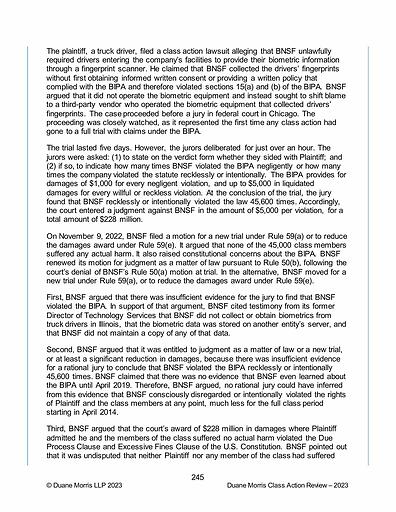Duane Morris Class Action Review - 2023 - Report - Page 245

Second, the landscape of privacy litigation remains very much in flux. In these class
actions to date, the plaintiffs’ bar primarily has alleged on behalf of employees and/or
consumers that companies improperly collected their biometric data for a host of
functions, such as to enhance their timekeeping systems, to promote their security, to
increase employee productivity, to enhance their sales, or to facilitate consumer
transactions. In response to these lawsuits, employers have mounted a litany of
defenses, many of which remain untested or unsettled. Some of these defenses
surround: (i) the length of the statute of limitations; (ii) the accrual of the statute of
limitations for purposes of starting the clock; (iii) whether each allegedly unlawful scan
or collection of data constitutes a discrete violation; (iv) whether biometric data actually
was collected, used, or stored; (v) whether exemptions related to health care providers
apply; and (vi) whether and to what extent alleged violations occurred in Illinois for
purposes of satisfying extraterritoriality limitations. Courts are starting to consider these
defenses, contributing to a patch-work quilt of rulings in 2022 that are likely to prompt
additional litigation and uncertainty.
Third, these factors have contributed to wave of high-dollar-value settlements. In terms
of settlement value, the settlement in the litigation captioned In Re Facebook Biometric
Information Privacy Litigation, Case No. 15-CV-03747 (N.D. Cal. Feb. 26, 2021),
approved in February 2021, remains at the top, with a whopping $650 million price tag.
In that case, plaintiffs alleged that Facebook collected and stored the biometric data of
users in Illinois through its use of “Tag Suggestions” and other features involving facial
recognition technology, without providing users proper notice and obtaining consent, in
violation of the BIPA. Over the past two years, defendants have entered into several
other eight-figure settlements stemming from privacy class actions against Google
($100 million), TikTok ($92 million), and others. These eye-popping figures demonstrate
the continued potency of BIPA litigation in terms of financial exposure and explain the
continued interest in BIPA litigation on the part of the plaintiffs’ class action bar. The
continued uncertainty of the BIPA’s parameters is likely to continue to fuel settlement
numbers over the upcoming year.
This Chapter analyzes the key decisions and settlements over the past year, providing
companies a one-of-its-kind resource to assess the past, present, and future of complex
privacy litigation.
II.
Key Rulings In Privacy Class Actions
A.
First Illinois BIPA Class Action Verdict
In Rogers, et al. v. BNSF Railway Co., Case No. 19-CV-03083 (N.D. Ill. Oct. 12, 2022),
the first federal court jury trial in a case brought under the BIPA, the plaintiffs secured a
verdict in favor of the class of 45,000 workers against Defendant BNSF. After a weeklong trial in the U.S. District Court for the Northern District of Illinois in Chicago, the jury
found that BNSF recklessly or intentionally violated the law 45,600 times, based on the
defense expert’s estimated number of drivers who had their fingerprints collected. The
court thereafter entered a judgment against BNSF for $228 million.
244
© Duane Morris LLP 2023
Duane Morris Class Action Review – 2023













